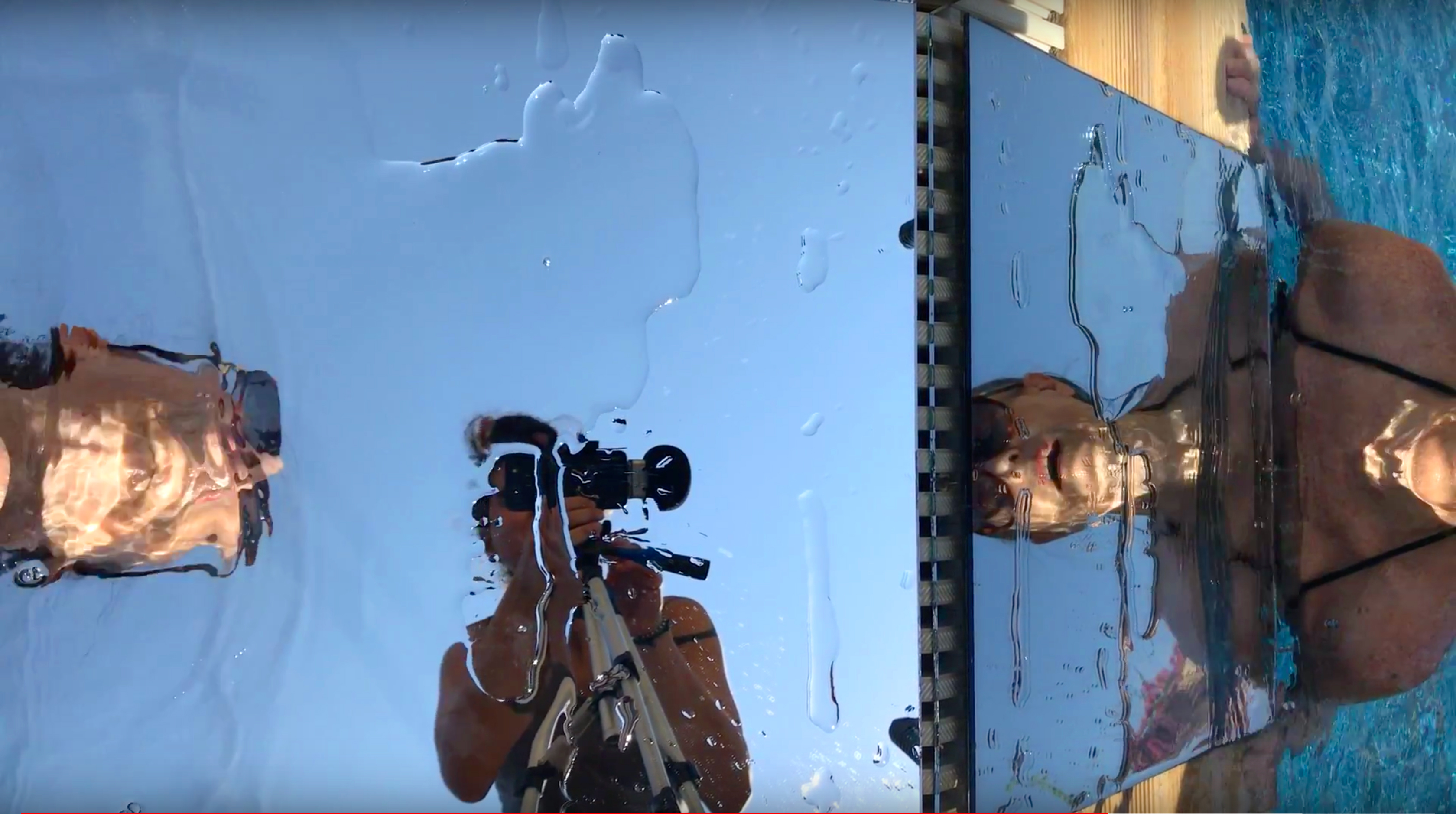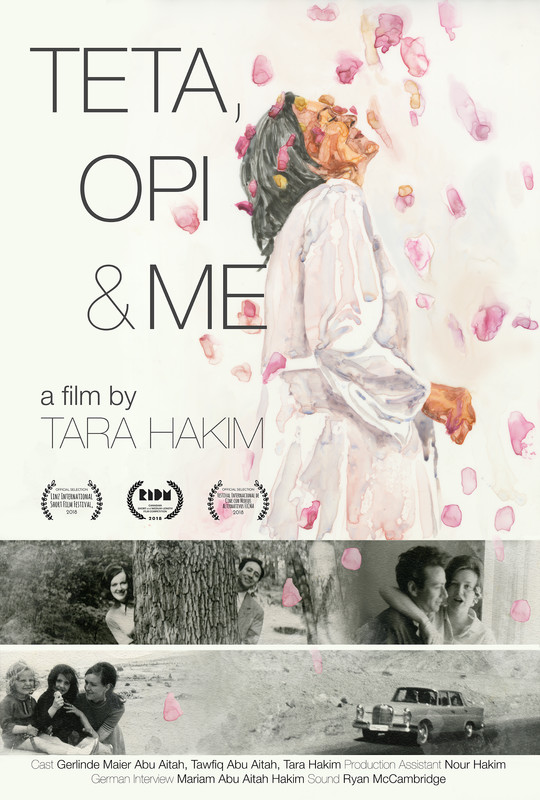A love story that refutes everything that we know
Shot entirely on an iPhone, Teta, Opi & Me is a poetic, meditative, multilingual and feeling-driven short film, documenting the intricacies of Tara Hakim’s playful process in capturing her grandparents’ enduring romance through social, political and racial adversity.
Notes from the MoMo Jury: “What an incredible story and an honour to hear it. A lovely snippet into the world of someone else’s love.”
We are very proud to have Teta, Opi & Me in this year’s Official Selection of Mobile Motion Film Festival. The film will be screened on May 11 at Kosmos in Zurich.

“Over a short Christmas break, I went to visit my grandparents with a large video camera, a boom mic and a tripod bigger than myself. As soon as I turned on those devices all sense of the grandparent granddaughter dynamic disappeared and the essence of my grandparents and what I had wanted to show disappeared alongside it too.” Tara Hakim
Interview with Tara
What is the story behind your film?
Teta, Opi & Me is my first documentary film. It is a story about my grandparents and their enduring romance. It was their love for each other, and my love for them that drove me to ask questions, and the more I found out the more I wanted to know.
Slowly, in fragments, in glimpses, in little stories, in late night conversations, over a meal or a swim—through my many experiences and interactions with them as a curious granddaughter—I began to see a story emerge, and a beautiful story it is.
It is a story I wanted to tell for years, and one that I thought deserves to be known and seen by a wider audience. It is a story that refutes everything that we know and were told about what was possible in that area and time. It is a story about love, appreciation, tolerance and respect: a story that is perhaps relevant now more than ever.
It is a story about a cross-cultural love and existence that has weathered time, change and experience. It is an intergenerational dialogue that is pulled together by the forces of their family histories, memories, and the desire for self-discovery on my end.
What were the steps which led you to make it?
I was applying for an MFA in documentary media at Ryerson university and one of the requirements was a research proposal. It was immediately clear that this was my chance to tell my grandparents’ story. And that is precisely what I did.
For many years prior to entering the program, I filmed my grandparents as a curious granddaughter. When I got into the program, I was still their curious granddaughter, only then I became a filmmaker with a vision too.
Why did you choose a smartphone to film with?
At the beginning of the process I had not decided that I would film with a smartphone. I was open to the possibilities, and having access to an array of equipment through school made me inclined to use other equipment. Over a short Christmas break, I went to visit my grandparents with a large video camera, a boom mic and a tripod bigger than myself.
As soon as I turned on those devices all sense of the grandparent granddaughter dynamic disappeared and the essence of my grandparents and what I had wanted to show disappeared alongside it too. I knew then, that the reason why I was the person to make this film was because of our relationship and familial connection, and that I needed to do whatever I could to express that.
Like I mentioned, I had always filmed my grandparents, and I always did it with my iPhone. So naturally, I decided to go back to that. And it worked.
What equipment did you use?
I used the iPhone 7 for most of the film’s footage, and at times I used an iPhone 5 for a second camera angle. I mainly filmed using the Filmic Pro App, however, when there were spontaneous moments that I had the urge to film as I spent my time with my grandparents, I had to resort to using the iPhone’s native camera app.
I was working with the basic Filmic Pro app, which meant I filmed my footage in Natural settings, not in Log or Flat. For most of the sound, I used a Zoom iQ7 Mid-Side Stereo Microphone. As for the interviews, I used lavalier mics and a Zoom H5 recorder. To edit my film, I used Final Cut Pro.
How much did you know about filmmaking before you made this film?
As I mentioned, this was my first film. I had worked with video in the past and had experimented with the form, but this was my first time tackling the long process of making a film- from pre-production, to production and post-production. I was learning as I was creating.

What did you like about filming with a phone? What were the downsides, if any?
I loved its immediacy, intimacy and its ability to easily become forgotten and become a part of our lives and daily routine. I also found that its extreme portability allowed for a freedom and an overall poetic and reflexive aesthetic that reveals and lays bare the seams that tie together reality and the representation of that reality while simultaneously asserting my presence and subjectivity, my unavoidable bond to my subjects.
Has making the film changed your life in any way?
First and foremost, it allowed me to capture and document a story that I had always wanted to tell. It also brought a lot of joy to my family, and to my grandparents, and they are already eager to start the next one!
Personally, it allowed me to be a part of the filmmaking process from beginning to end, it allowed me to learn and expand my knowledge and expertise and it has fortunately been received quite well. It has given me courage and inspiration to tell more stories, and to always follow my vision, feeling and creative impulses.
How successful was the film, personally and in gaining an audience for your work?
With time it is proving to be more and more successful. It has already screened at five different festivals around the world and has allowed me to make good contacts in the industry. That said, festivals are not enough. I have to actively talk about my work, actively make an effort to meet people and most importantly, I have to keep creating more work.
Looking back on the movie, is there anything you’d have done differently?
There are a lot of things that came up after the process that I have learnt from, and that would alter my process and approach next time. However, I think I could have only made the film that I made. The footage I took allows for multiple stories to be told, and perhaps even different iterations. I think their story is one I will return to, and one that I will create more work from in the future. I’m leaning towards an installation.
How important are film festivals that give these kind of films a platform for you?
I think film festivals that are dedicated to these kinds of films are extremely important. It is already rather difficult to justify this sort of filmmaking, and sadly there is still the connotation of ‘amateur’ associated with mobile filmmaking.
I believe it is through niche festivals and organizations that change can happen, recognition can be found, and more great work can be appreciated.
Read Next: The Mobile Motion Film Festival.
Eager to learn more?
Join our weekly newsletter featuring inspiring stories, no-budget filmmaking tips and comprehensive equipment reviews to help you turn your film projects into reality!
andreaholle_184e0he5
Founder & Director of Mobile Motion Film Festival.
Andrea studied Business Communication at the Lucerne University of Applied Sciences

